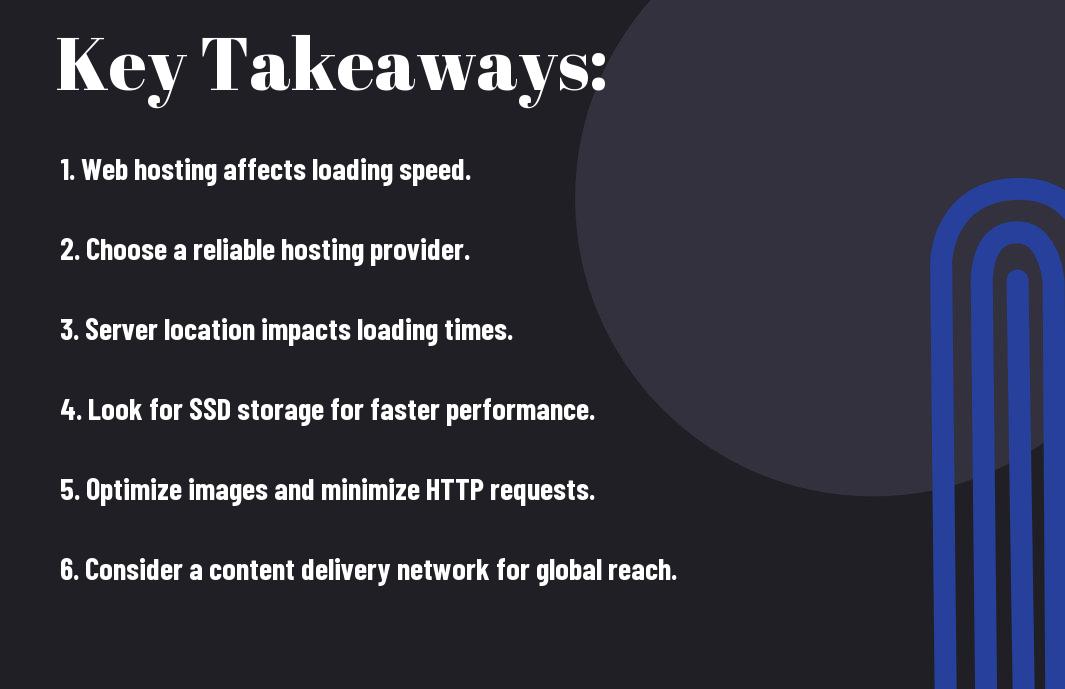Are you aware of the crucial role that your web hosting service plays in the loading speed of your website? The quality of your web hosting can either make or break your website’s performance. From loading time to overall user experience, the choice of web hosting provider has a significant impact on the success of your website. In this post, we will delve into the impact of web hosting on website loading speed and provide you with valuable insights on how to optimize your hosting for better performance. Whether you are a business owner, a web developer, or simply a website owner looking to improve your site’s speed, this information is essential for you.
Key Takeaways:
- Choice of Web Hosting: The type of web hosting service you choose can have a significant impact on your website’s loading speed. Opting for a high-quality hosting provider with fast servers and solid infrastructure can help improve your site’s performance.
- Server Location: The physical location of your web hosting server can affect the loading speed of your website. Choosing a server location that is closer to your target audience can help reduce latency and improve loading times for your visitors.
- Performance Optimization: In addition to selecting the right web hosting provider and server location, implementing performance optimization techniques such as caching, image optimization, and content delivery networks (CDNs) can further enhance your website’s loading speed.

Understanding Web Hosting
Clearly, web hosting plays a crucial role in the performance of your website. The quality and type of hosting you choose can significantly impact the loading speed of your site. To understand the impact of web hosting on page load speed, you can read this insightful article on How Web Hosting Can Impact Page Load Speed.
Types of Web Hosting Services
When it comes to web hosting, there are several options available, each with its own benefits and drawbacks. The most common types of web hosting services include shared hosting, VPS hosting, dedicated hosting, and cloud hosting. Each of these options offers different levels of performance, security, and scalability. This information is broken down in the following table:
| Hosting Type | Key Features |
|---|---|
| Shared Hosting | Cost-effective, limited resources, slower performance |
| VPS Hosting | Virtual private server, scalable, better performance |
| Dedicated Hosting | Entire server for your website, high performance, expensive |
| Cloud Hosting | Scalable, reliable, pay-as-you-go pricing |
| Managed Hosting | Managed by provider, less control, optimized performance |
This breakdown will help you understand which type of hosting best suits your business needs. This knowledge will enable you to make an informed decision when choosing a web hosting service for your website. It is important to carefully consider your website’s traffic volume, budget, and technical requirements when selecting a web hosting service. This will ensure that your website performs at its best.
Factors That Impact Hosting Performance
When it comes to web hosting, there are several factors that can impact the performance of your website. Server location, hardware, software, network connectivity, and server load are all important factors to consider. Any of these factors can have a direct impact on the loading speed and overall performance of your website. By understanding how these elements can affect your hosting performance, you can make informed decisions to optimize your website’s speed and reliability.
Website Loading Speed Fundamentals
For an optimal user experience, it is crucial that your website loads quickly. Slow loading times can frustrate visitors, leading them to abandon your site and seek information elsewhere. Understanding the fundamentals of website loading speed is essential to maintaining a fast and responsive website that keeps visitors engaged.
Elements That Determine Loading Speed
Several factors contribute to the loading speed of a website. The size and complexity of your web pages, the quality of your web hosting, the efficiency of your website’s code, and the user’s internet connection all play a significant role in determining how quickly your website loads. Large images, excessive plugins, and overly complex layouts can slow down your website, while a reliable web hosting service, streamlined code, and optimized design can significantly improve loading times.
Tools for Measuring Website Speed
Measuring your website’s loading speed is critical for identifying areas for improvement. Fortunately, there are various tools available that allow you to measure and analyze your website’s speed performance. Tools such as Google’s PageSpeed Insights, GTmetrix, and Pingdom provide valuable insights into your website’s loading speed, highlighting areas that need attention and improvement. By regularly monitoring your website’s speed using these tools, you can identify and address any issues that may be hindering your website’s performance.
Optimizing Web Hosting for Speed
Keep in mind that the choice of web hosting provider and the way you configure your hosting environment can have a significant impact on the speed of your website. You can learn more about this in our blog post How Your Web Host Impacts Website Performance.
Choosing the Right Hosting Provider
When it comes to choosing a hosting provider, reliability and speed should be your top priorities. Look for a provider that offers fast and secure servers, 24/7 technical support, and a solid-state drive (SSD) storage option. Make sure they also offer a content delivery network (CDN) and good uptime to ensure your website is always accessible to your visitors.
Configuration and Best Practices for Speed Improvement
Once you’ve chosen the right hosting provider, it’s essential to configure your hosting environment for optimal speed. This includes using caching plugins, optimizing images and code, and enabling compression. Additionally, consider minifying CSS and JavaScript files and implementing browser caching to further improve loading times. By following these best practices, you can dramatically enhance your website’s speed and performance.
Case Studies and Real-World Examples
Now let’s take a look at some real-world examples to illustrate the impact of web hosting on website loading speed. Here are a few case studies with numbers and data:
- Case Study 1: A company upgraded their hosting to a VPS solution and saw a 40% increase in website loading speed.
- Case Study 2: Another business moved their website to a dedicated server and experienced a 50% reduction in loading time.
- Case Study 3: A small blog upgraded from shared hosting to a cloud hosting solution and saw a 30% improvement in loading speed.
Impact of Hosting Upgrades on Speed
When you upgrade your hosting, whether it’s moving to a VPS, dedicated server, or cloud hosting solution, you can significantly improve your website’s loading speed. This is often due to the increased resources and better performance offered by these upgraded hosting options. Additionally, the improved server architecture and optimization for speed can have a direct impact on how quickly your website loads for your visitors.
Comparative Analysis of Hosting Solutions and Speed
When it comes to choosing the right hosting solution for your website, it’s important to consider the impact on loading speed. Here’s a comparative analysis of hosting solutions and their speed performance:
| Hosting Solution | Speed Performance |
| Shared Hosting | Can be slower due to resource sharing |
| VPS Hosting | Offers more resources for faster loading |
| Dedicated Server | Provides maximum speed and performance |
| Cloud Hosting | Scalable and optimized for speed |

The Impact of Web Hosting on Website Loading Speed
Ultimately, your choice of web hosting service can have a significant impact on your website’s loading speed. The quality of your hosting service, including factors such as server hardware, network connections, and location, will directly affect how quickly your website loads for visitors. By choosing a reliable and high-performance web hosting provider, you can ensure that your website loads quickly and efficiently, providing a better user experience for your visitors. It’s important to carefully consider the hosting options available to you and make an informed decision based on the specific needs of your website.
FAQ
Q: What is the impact of web hosting on website loading speed?
A: Web hosting plays a crucial role in website loading speed as it determines the server infrastructure and resources available for delivering content to users.
Q: How does the choice of web hosting provider affect website loading speed?
A: The choice of web hosting provider directly influences website loading speed through factors such as server location, network connectivity, hardware infrastructure, and optimization technologies.
Q: What are the signs of a web hosting provider affecting website loading speed?
A: Signs of a web hosting provider impacting website loading speed include slow page load times, frequent downtime, and inconsistent performance across different devices and geographic locations.
Q: How can website owners improve loading speed through web hosting choices?
A: Website owners can improve loading speed by selecting a reliable web hosting provider with fast servers, solid-state drives (SSD), content delivery networks (CDN), and optimized server configurations for specific content management systems.
Q: What are the best practices for optimizing website loading speed through web hosting?
A: Best practices for optimizing website loading speed through web hosting include regular performance monitoring, leveraging caching and compression technologies, and choosing a hosting plan that aligns with the website’s traffic and resource needs.
CATEGORY:Web Hosting

